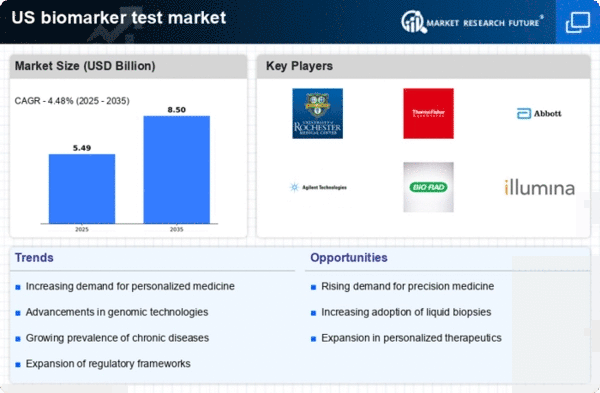Advancements in Genomic Research
Recent advancements in genomic research are significantly influencing the biomarker test market. The completion of the Human Genome Project and ongoing research initiatives have led to a deeper understanding of genetic markers associated with various diseases. This knowledge enables the development of highly specific biomarker tests that can predict disease susceptibility and treatment responses. In the US, the market for genomic testing is expected to reach approximately $25 billion by 2026, reflecting a growing trend towards precision medicine. As healthcare providers increasingly rely on genomic data to inform clinical decisions, the demand for biomarker tests is likely to rise. This shift towards integrating genomic insights into routine diagnostics is expected to enhance the efficacy of treatments and improve patient outcomes, thereby propelling the biomarker test market forward.
Rising Prevalence of Chronic Diseases
The increasing incidence of chronic diseases such as cancer, diabetes, and cardiovascular disorders is a primary driver for the biomarker test market. In the US, chronic diseases account for approximately 70% of all deaths, highlighting the urgent need for effective diagnostic tools. Biomarker tests facilitate early detection and personalized treatment plans, which are crucial in managing these conditions. The market is projected to grow as healthcare providers increasingly adopt biomarker testing to improve patient outcomes. Furthermore, the financial burden of chronic diseases on the healthcare system, estimated at over $3.5 trillion annually, underscores the necessity for innovative diagnostic solutions. This trend indicates a robust demand for biomarker tests, as they play a pivotal role in the early identification and management of chronic illnesses, thereby driving growth in the biomarker test market.
Increased Investment in Healthcare R&D
The surge in investment in healthcare research and development (R&D) is a significant driver for the biomarker test market. In the US, healthcare R&D spending has reached over $200 billion annually, with a substantial portion allocated to developing innovative diagnostic tools. This financial commitment fosters the advancement of biomarker tests, as companies seek to create more accurate and efficient testing methods. The focus on R&D is further supported by public and private partnerships, which aim to accelerate the translation of research findings into clinical applications. As new biomarkers are discovered and validated, the market is likely to expand, offering a wider array of testing options for healthcare providers. This trend indicates a robust pipeline of biomarker tests, which could enhance diagnostic capabilities and improve patient care in the biomarker test market.
Growing Demand for Preventive Healthcare
The increasing emphasis on preventive healthcare is driving the biomarker test market. As patients and healthcare providers recognize the importance of early detection and intervention, the demand for biomarker tests is expected to rise. In the US, preventive healthcare measures are projected to save the healthcare system approximately $300 billion annually by reducing the need for more extensive treatments. Biomarker tests play a crucial role in identifying risk factors and enabling timely interventions, which can lead to better health outcomes. This shift towards prevention is supported by public health initiatives and educational campaigns that promote awareness of the benefits of early testing. Consequently, the biomarker test market is likely to experience growth as more individuals seek out testing options to proactively manage their health.
Technological Integration in Healthcare Systems
The integration of advanced technologies into healthcare systems is a key driver for the biomarker test market. Innovations such as artificial intelligence (AI), machine learning, and big data analytics are transforming how biomarker tests are developed and utilized. In the US, the healthcare technology market is projected to exceed $500 billion by 2027, indicating a strong trend towards adopting cutting-edge solutions. These technologies enhance the accuracy and efficiency of biomarker tests, enabling healthcare providers to make more informed decisions. Additionally, the use of digital health platforms facilitates easier access to testing and results, further driving market growth. As healthcare systems increasingly embrace technological advancements, the biomarker test market is likely to benefit from improved testing capabilities and enhanced patient engagement.
















